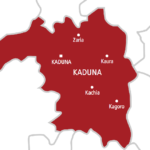
The International Monetary Fund (IMF) has warned that about 40 percent of the low income countries are on a high risk of distress following increase in public debt.
Anna Ilyina, who heads the Emerging Economies Regional Studies Division in the IMF’s European Department, made the disclosure at a press briefing on the release of the Global Financial Sustainability report and the Fiscal Monitor report at the ongoing IMF Spring meeting in Washington DC.
She said easy financial conditions continue to fuel financial vulnerability, leaving the global economy exposed to the risk of a sharp tightening in financial conditions.
“Countries that are building up high debt levels and currency mismatch are going to be exposed to financial stability issues,” she stressed.
The United Nations Industrial Development Organisation (UNIDO) in a report in 2016 classified Nigeria as a lower middle-income country alongside Cape Verde, Cameroon, Republic of Congo, Côte d’Ivoire, Djibouti, Ghana, Kenya, Lesotho, Mauritania, São Tomé and Principe, Swaziland, and Zambia.
The IMF warning is coming on the heels of recent concerns about Nigeria’s rising debt profile, with a former Deputy Governor of the Central Bank of Nigeria (CBN), Professor Kingsley Moghalu, advising the Federal Government to put a stop to further foreign borrowing.
Nigeria’s external debt rose to $18.91 billion (N5.787 trillion) as at the end of December 2017, while domestic debt rose to N15.937 trillion, bringing the total debt stock of the country to N21.725 trillion ($70.92 billion), latest data released by the Debt Management Office (DMO) has shown.
Although relative to Gross Domestic Product (GDP), the country’s debt level remains low by global standards, but it has put a strain on government revenues due to associated high debt service cost.
According to Moghalu, the increased foreign borrowing which the government raised in the past three years has put the country “back into a debt trap that will weigh down the future generations of Nigeria.”
Similarly, Catherine Patillo, Advisor and Chief of the Low-Income Countries Strategy Unit in IMF’s Strategy, Policy and Review Department, at the briefing on Fiscal Monitor, emphasised that with rising debt, countries need to deliver on high return investment, deliver on fiscal plans and tax capacities.



